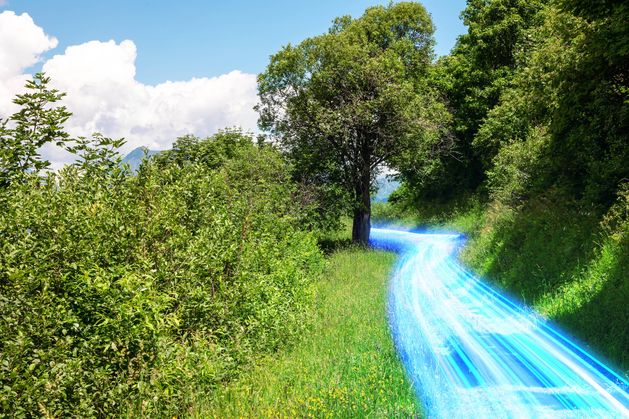National Broadband Ireland (NBI), the company responsible for delivering the Government’s National Broadband Plan (NBP), said 50pc of premises are now ready to connect to the network, with high-speed fibre broadband having transformed the economic potential of rural areas.
Tens of thousands of rural-based workers are now able to work remotely on a full- or part-time basis because of high-speed internet access.
The project has involved laying 42,000km of fibre cable across Ireland – enough to circumnavigate the Earth.
NBI revealed that of the 564,000 homes in the special intervention area – a zone that the Government decided was vital to have high-speed broadband access for strategic national economic and social reasons – there are now 283,639 connected or in the process of being connected with fibre cabling.
Those 283,639 premises include homes, farms and businesses.
There are 91,739 premises that have already ordered NBI fibre broadband and are now connected.
NBI said the average take-up rate is well ahead of projections and international comparisons. The connection rate has reached 50pc in areas where the network has been live for the longest.
Almost 93pc of premises – 525,649 homes, farms and businesses – have now completed the survey stage of the programme.
A total of 83pc of the project targets (466,725 properties) have moved to or through construction. And 955 broadband connection points (BCPs) have been installed and are live, with 672 of these located in schools.
The high-speed broadband plan roll-out also extends to 27 Irish islands, with 10 already live on the network.
The remaining 17 islands are in various stages of survey and design for installation.
Construction has been completed or is currently under way for 466,725 premises – with 93pc of premises included in the roll-out area having been surveyed.
Communications Minister Ossian Smyth said it was an incredible success story.
“Ireland has reached the milestone where half of all homes, farms and businesses in rural Ireland can access high-speed fibre broadband,” he said.
“It is life-changing for rural communities. The progress to date reaffirms the Government’s commitment to extending fibre broadband access to everyone living and working in Ireland.”
NBI chief executive Peter Hendrick said the rollout was ongoing and remained on its timeframe and budget.
“NBI has maintained momentum throughout the year and the rollout is progressing on budget and is on schedule,” he said.
“We are now passing 10,000 new homes and businesses with high-speed fibre broadband every month, which leaves us well placed to complete the rollout by the end of 2026.
“The feedback from our customers has been incredibly positive.
“A connection to NBI fibre broadband is enabling people to move to rural Ireland and work remotely, allowing farmers to boost their productivity with new tech, and empowering entrepreneurs to launch new businesses.
“The NBI network is creating limitless opportunities for rural Ireland.”
The state intervention area for the NBP encompasses 564,000 premises and over 1.1 million people. This includes 65,000 farms, almost 700 schools and 44,000 non-farm businesses.
Rural rights campaigners say the NBP ranks as one of the most important social and economic initiatives of the past 50 years.
It also includes any new homes built in the special intervention area over the next 25 years.
Last February, the Black Valley in Kerry – the last place in Ireland to secure access to mains electricity – was successfully surveyed and cleared for connection to high-speed broadband over the summer.
Black Valley residents were only connected to the national electricity grid in 1976 – with locals once joking that the area got its name for having been left in the dark for so long without electric lighting.
Footage of Black Valley homes finally receiving electricity in 1976 is among the most famous to be found in the television archives in Ireland.
Now, Black Valley householders will boast high-speed broadband to compare with the fastest connections in Dublin, Cork and Limerick cities.

